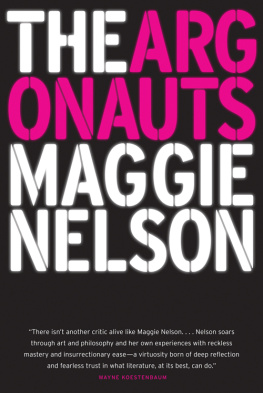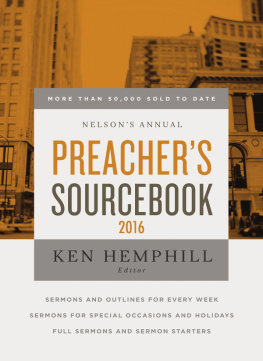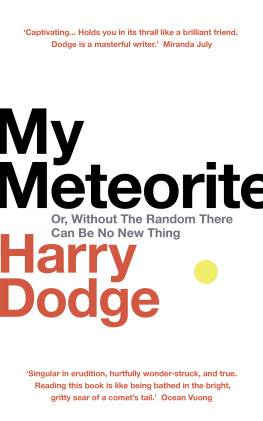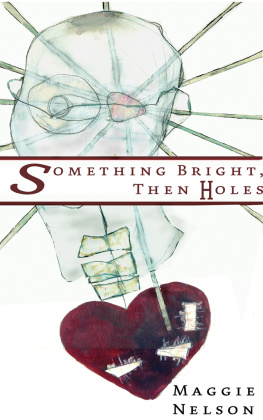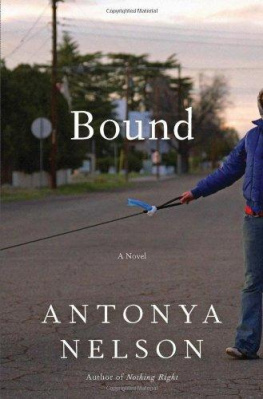THE ARGONAUTS
Maggie Nelson
Graywolf Press
Copyright 2015 by Maggie Nelson
This publication is made possible, in part, by the voters of Minnesota through a Minnesota State Arts Board Operating Support grant, thanks to a legislative appropriation from the arts and cultural heritage fund, and through a grant from the Wells Fargo Foundation Minnesota. Significant support has also been provided by Target, the McKnight Foundation, Amazon.com, and other generous contributions from foundations, corporations, and individuals. To these organizations and individuals we offer our heartfelt thanks.

The Argonauts is a project of the Creative Capital Foundation.
Published by Graywolf Press
250 Third Avenue North, Suite 600
Minneapolis, Minnesota 55401
All rights reserved.
www.graywolfpress.org
Published in the United States of America
Printed in Canada
ISBN 978-1-55597-707-8
Ebook ISBN 978-1-55597-340-7
2 4 6 8 9 7 5 3 1
First Graywolf Printing, 2015
Library of Congress Control Number: 2014960046
Cover design: Jeenee Lee Design
for Harry
October, 2007. The Santa Ana winds are shredding the bark off the eucalyptus trees in long white stripes. A friend and I risk the widowmakers by having lunch outside, during which she suggests I tattoo the words HARD TO GET across my knuckles, as a reminder of this poses possible fruits. Instead the words I love you come tumbling out of my mouth in an incantation the first time you fuck me in the ass, my face smashed against the cement floor of your dank and charming bachelor pad. You had Molloy by your bedside and a stack of cocks in a shadowy unused shower stall. Does it get any better? Whats your pleasure? you asked, then stuck around for an answer.
Before we met, I had spent a lifetime devoted to Wittgensteins idea that the inexpressible is containedinexpressibly!in the expressed. This idea gets less air time than his more reverential Whereof one cannot speak thereof one must be silent , but it is, I think, the deeper idea. Its paradox is, quite literally, why I write , or how I feel able to keep writing.
For it doesnt feed or exalt any angst one may feel about the incapacity to express, in words, that which eludes them. It doesnt punish what can be said for what, by definition, it cannot be. Nor does it ham it up by miming a constricted throat: Lo, what I would say, were words good enough . Words are good enough.
It is idle to fault a net for having holes , my encyclopedia notes.
In this way you can have your empty church with a dirt floor swept clean of dirt and your spectacular stained glass gleaming by the cathedral rafters, both. Because nothing you say can fuck up the space for God.
Ive explained this elsewhere. But Im trying to say something different now.
Before long I learned that you had spent a lifetime equally devoted to the conviction that words are not good enough. Not only not good enough, but corrosive to all that is good, all that is real, all that is flow. We argued and argued on this account, full of fever, not malice. Once we name something, you said, we can never see it the same way again. All that is unnameable falls away, gets lost, is murdered. You called this the cookie-cutter function of our minds. You said that you knew this not from shunning language but from immersion in it, on the screen, in conversation, onstage, on the page. I argued along the lines of Thomas Jefferson and the churchesfor plethora, for kaleidoscopic shifting, for excess. I insisted that words did more than nominate. I read aloud to you the opening of Philosophical Investigations. Slab , I shouted, slab!
For a time, I thought I had won. You conceded there might be an OK human, an OK human animal, even if that human animal used language, even if its use of language were somehow defining of its humannesseven if humanness itself meant trashing and torching the whole motley, precious planet, along with its, our, future.
But I changed too. I looked anew at unnameable things, or at least things whose essence is flicker, flow. I readmitted the sadness of our eventual extinction, and the injustice of our extinction of others. I stopped smugly repeating Everything that can be thought at all can be thought clearly and wondered anew, can everything be thought.
And youwhatever you argued, you never mimed a constricted throat. In fact you ran at least a lap ahead of me, words streaming in your wake. How could I ever catch up (by which I mean, how could you want me? ).
A day or two after my love pronouncement, now feral with vulnerability, I sent you the passage from Roland Barthes by Roland Barthes in which Barthes describes how the subject who utters the phrase I love you is like the Argonaut renewing his ship during its voyage without changing its name. Just as the Argos parts may be replaced over time but the boat is still called the Argo , whenever the lover utters the phrase I love you, its meaning must be renewed by each use, as the very task of love and of language is to give to one and the same phrase inflections which will be forever new.
I thought the passage was romantic. You read it as a possible retraction. In retrospect, I guess it was both.
Youve punctured my solitude , I told you. It had been a useful solitude, constructed, as it was, around a recent sobriety, long walks to and from the Y through the sordid, bougainvillea-strewn back streets of Hollywood, evening drives up and down Mulholland to kill the long nights, and, of course, maniacal bouts of writing, learning to address no one. But the time for its puncturing had come. I feel I can give you everything without giving myself away , I whispered in your basement bed. If one does ones solitude right, this is the prize.
A few months later, we spent Christmas together in a hotel in downtown San Francisco. I had booked the room for us online, in the hope that my booking of the room and our time in the room would make you love me forever. It turned out to be one of those hotels that booked for cheap because it was undergoing an astonishingly rude renovation, and because it was smack in the middle of the cracked-out Tenderloin. No matterwe had other business to attend to. Sun filtered through the ratty Venetian blinds just barely obscuring the construction workers hammering away outside as we attended to it. Just dont kill me , I said as you took off your leather belt, smiling.
After the Barthes, I tried again, this time with a fragment of a poem by Michael Ondaatje:
Kissing the stomach
kissing your scarred
skin boat. History
is what youve travelled on
and take with you
Weve each had our stomachs
kissed by strangers
to the other

